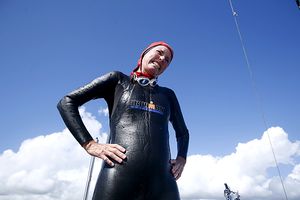By Nick Hoult in Goa
Perhaps that is the burden buying an English cricketer places on the shoulders of an Indian Premier League team owner.
Then again perhaps it was the only stumble on a day when eight franchise owners pushed away the growing tide of a worldwide recession to splash the cash in Goa, a state where the beaches and five star hotels hide an impoverished local community.
The ageing hippies, who made Goa their home in the 1960s, must have been choking on their pipes of peace as some of the world's richest people lavished millions on England's Andrew Flintoff and Kevin Pietersen.
Both were sold for the same fee – $1.55 million – and share the title as the world's most expensive cricketer. Lalit Modi, the commissioner of the IPL, was quick to thank the England & Wales Cricket Board for making them available for three weeks of this year's IPL.
Vijay Mallya, the owner of Bangalore, was even quicker to say he would "love" Pietersen to be available for double that time in 2010. Flintoff, who was signed by team that sounds like a cigarette, the Chennai Super Kings, and Pietersen, will already be flicking through next year's diary. A Test series at home against Bangladesh, which is likely to clash with the IPL, will test their pride in the England shirt.
As expected, Flintoff was the biggest draw and as soon as the wooden stump bearing his name was pulled out of the bag, several team owners leaned forward in their chairs. Each had to lift a flashing red bat to signal their intention to bid. The auction room was soon ablaze with light as Rajasthan, the IPL champions, fought Chennai for Flintoff.
"Freddie would have got more if he had been drawn out later," said Manoj Badale, the British businessman and part-owner of the Rajasthan Royals. "An element of luck played its part because if he had been drawn out first then the teams would have had more of their $2 million budget to spend." Poor Freddie. Somehow he has got to live on $250,000 per week.
For Pietersen, Bangalore was always his destination. Of all the billionaires – the IPL does not do mere millionaires – sat in the auction room Mallya's fortune is probably the only one to be improved by a recession.
In hard times it pays to be a liquor baron and for a man with a $1.5 billion fortune, buying Pietersen was mere small beer. Mallya, the owner of the Kingfisher brewery, was prepared to spend more to sign Pietersen, a player he feels will make an excellent captain, whatever reference the ECB provides.
"I was very keen to get Pietersen and I am happy to get him for the price we did," he said. "I think it is a worthwhile investment in a great player."
Mallya is a man who wants results. KP will have to deliver. Last year Mallya sacked the team's chief executive after the side finished second last in the IPL and then publicly criticised Rahul Dravid, one of India's finest cricketers and the Bangalore captain. Thanks to recent experience, Pietersen will probably be glad to be judged on results alone.
Flintoff and Pietersen were always expected to attract the big deals but it was also a good day for Paul Collingwood, Owais Shah and Ravi Bopara. Shah and Collingwood will both play for the Delhi Daredevils with $275,000 salaries but Bopara benefited from a bidding war between two teams to carve out a $450,000 deal with Zinta's Kings XI Punjab.
"He is a great player and an all-rounder and we wanted someone who we feel can contribute in more than one way to the team," said Zinta.
There were losers. Thirty-three players were left unsold and England scored a small victory ahead of the Ashes. Only two Australians were bought and their combined value was lower than the $650,000 Calcutta paid for a Bangladesh bowler, Mashrafe Mortaza. Only the very cynical would suggest Mortaza's signing was influenced by Calcutta's plan to play matches in cricket-mad Bangladesh.
Those left on the shelf included England's Luke Wright and Samit Patel. "Are we quite sure there are no bids," said English auctioneer Richard Madley as Patel's name was met with silence.
Somehow there's a touch of schadenfreude in seeing an elite sportsman reduced to being the only kid in the playground not to be picked.
IPL auction in numbers:
$1.55m: Andrew Flintoff (ENG) - Chennai Super Kings, Kevin Pietersen (ENG) - Bangalore Royal Challengers
$950,000: Jean-Paul Duminy (RSA) - Mumbai Indians
$650,000: Tyron Henderson (RSA) - Rajasthan Royals
$600,000: Mashrafe Mortaza (BAN) - Kolkata Knight Riders
$450,000: Ravi Bopara (ENG) - Kings XI Punjab
$375,000: Shaun Tait (AUS) - Rajasthan Royals
$275,000: Owais Shah (ENG) - Delhi Daredevils, Paul Collingwood (ENG) - Delhi Daredevils
$160,000: Jesse Ryder (NZL) - Bangalore Royal Challengers
$150,000: Fidel Edwards (WIS) - Deccan Chargers, Kyle Mills (NZL) - Mumbai Indians, Jerome Taylor (WIS) - Kings XI Punjab
$140,000: Thilan Thushara (SRI) - Chennai Super Kings
$100,000: Dwayne Smith (WIS) - Deccan Chargers
$75,000: Mohammad Ashraful (BAN) - Mumbai Indians
$50,000: George Bailey (AUS) - Chennai Super Kings
Original here
 Exclusive! Subway has officially de-linked Michael Phelps as they prepare to drop his recently announced sponsorship deal. Before Michael’s bong hits hit the headlines, Michael Phelps was featured on the Subway web site. However, since the swimmer’s pothead scandal, Subway has removed all links to pages featuring the Olympic swimmer (see below).
Exclusive! Subway has officially de-linked Michael Phelps as they prepare to drop his recently announced sponsorship deal. Before Michael’s bong hits hit the headlines, Michael Phelps was featured on the Subway web site. However, since the swimmer’s pothead scandal, Subway has removed all links to pages featuring the Olympic swimmer (see below). 





